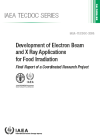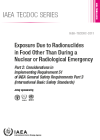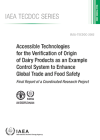International Symposium on Food Safety and Control
27–31 May 2024, Vienna, Austria
Registration for Virtual Attendance as an Observer
Those who would like to follow the symposium virtually through the IAEA Conference and Meetings App as an observer only, should register using the following link:
Background and Objectives
Food control systems underpin food safety and quality, which are vital components of food security and are both necessary to safeguard international trade in food commodities. Food control systems are under increasing pressure due to various factors, including the disruptive effects of pandemics, food-borne diseases, and conflicts affecting food production, distribution, and supply chains. Climate change is also influencing patterns of food contamination as profound changes in weather patterns affect the conditions necessary for microbes and pests to thrive, and therefore changing climates impact food-illness, wastage, and losses.
Nuclear techniques play an important role in analytical laboratory services as many of the separation, identification, and quantification methods that are employed fundamentally rely on a nuclear related phenomenon. Some examples are isotope analysis to characterise the origin of food, nuclear spin in nuclear magnetic resonance, ionization for mass spectrometry, and mass spectrometric separation based on the mass differences of nuclei. Nuclear techniques are often used in conjunction with complementary, non-nuclear methods to provide powerful solutions to food safety and control problems. This includes the need to address food safety and quality requirements for market access. Being able to detect chemical and microbiological contaminants and to control food-borne disease are necessary for this purpose, as are capabilities to respond quickly to events that disrupt the food supply, using rapid, field-based testing methods.
Food processing techniques also include nuclear related technologies. For example, pre-packaged fresh fruits or vegetables exposed to a controlled dose of ionizing radiation as a phytosanitary measure to prevent the introduction and spread of viable regulated pests through trade in fresh produce, or the application of food irradiation to maintain food quality, prevent foodborne illness, reduce food losses, and extend product shelf-life.
The integration of nuclear techniques into food control systems can be secured by promoting awareness of the possibilities and comparative advantages of the techniques, and by encouraging dialogue and ensuring good communication between the relevant actors, including research centres, academia, regulatory bodies and industry. Nuclear technologies can also contribute in the framework of global initiatives such as ‘One Health’, and have a role in helping address issues such as antimicrobial resistance and mitigation of the effects of climate change on the food supply.
This symposium will provide a forum for information sharing on cutting edge research and developments in the application of nuclear technologies for food safety and control, networking between the public and private sectors and defining future research needs and directions.
The purpose of the event is to bring together experts and stakeholders in food safety and food control systems to consider the protection of the integrity of the food supply chain and measures to improve its resilience to food security challenges such as the impacts of climate change, foodborne diseases, food fraud, antimicrobial resistance. It also includes methods to address external factors that may disrupt food control systems (e.g. caused by pandemics, conflict or other catastrophic events). Contemporary and novel applications of nuclear and complementary techniques will be presented, and future perspectives and opportunities discussed. The event will provide a forum for networking, facilitate a broad understanding of food safety and food control systems, and promote the peaceful use of nuclear technologies.
Main Topics
The Symposium will address the following topics:
1. Food authenticity and fighting food fraud
- Methods and systems to support food authenticity and combat food fraud
- Isotopic and elemental analysis for food authenticity and verification of production and geographical origin
- Field-deployable methods to check food authenticity at the point of contact
- Promotion of food authenticity for food safety and to improve nutrition
2. Food and phytosanitary irradiation
- Food irradiation to maintain and extend food quality, minimise pathogens in food and food packaging
- Phytosanitary applications of food irradiation to meet pest quarantine requirements
- Advances in machine source irradiation using electron beam and X rays including soft beam (keV) technologies
- Dosimetry and dose modelling for process control
3. Chemical residues and contaminants in food and feed
- Detection and control of chemical residues and contaminants in food and feed to protect human and animal health
- Contributing to antimicrobial resistance knowledge and control through antimicrobial residue monitoring
- Building resilience to climate change - laboratory capability to identify and respond to changing contamination patterns
4. Preparing for and responding to emergencies and incidents affecting the food supply
- Rapid, field-deployable screening tests for food contaminants
- Methodology to help trace contaminated products to origin
- Laboratory networks for fast response and communication
- Food irradiation for long-life emergency rations (for responders and those affected)
5. Detection and characterization of pathogens in food
- Nuclear and related techniques for the detection of pathogens in food
- Contributing to antimicrobial resistance knowledge and control through the detection and characterization of antimicrobial resistant organisms
6. Standard setting and risk assessment
- Procedures and engagement with Codex Alimentarius
- Irradiation dosimetry and generic treatments
- Risk-based food safety and control
- Labs and networks using nuclear-related methods to meet food safety/quality equivalence standards for trade
7. One Health
- Holistic approaches to human, animal and environmental health
Outcomes
- Improved recognition of the role of nuclear and related techniques in the field of food safety and control
- Increased appreciation and uptake of nuclear and related techniques to tackle key issues affecting food safety and quality to contribute to food security
- Improved collaboration and networking between food safety and quality stakeholders, including national and inter-governmental organizations, NGOs, academia and the private sector
- Enhanced resilience to issues impacting food safety in Member States (e.g. disruption to food control systems caused by external events such as pandemics, climate change, conflict or any other event that might affect food production, supply and distribution)
- Identification of future research directions and targets for the effective integration of nuclear technologies into food safety and control systems.
Audience
Participation is solicited from scientists, researchers, laboratory analysts, policymakers, regulators, food producers and others concerned with food safety and control systems and maintaining the integrity of the food supply chain.







